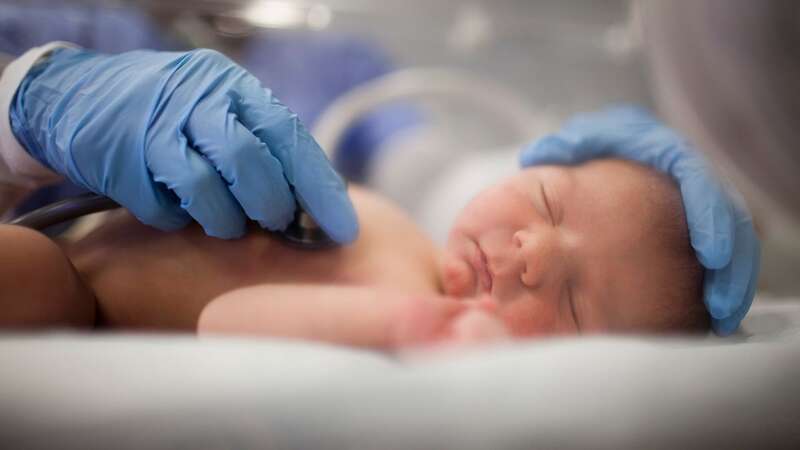

When it comes to meningitis in babies, acting quickly can be the difference between life and death.
The stark reality is meningitis and septicaemia, a form of blood poisoning caused by the same germs as meningitis, are life-threatening and can kill in hours. Many parents will know that a rash that does not fade when pressed with a glass is a warning sign of the condition - but this may not present itself.
In fact, there is an extensive list of meningitis symptoms, that may or not appear when a child or baby is in need of medical intervention. These are categorised by charities into 'red' signs where 'immediate action' is necessary (calling 99) and 'amber' signs where parents should 'get professional medical advice' such as calling 111.
Meningitis occurs when the lining around your brain and spinal cord (meninges) becomes inflamed. While it can affect people of all ages, it is most common in babies, children, teens, and young adults - meaning it can be a constant anxiety for new parents.
According to the NHS, if your baby has a 'bulging sift spot on the top of their head' - you should go to a hospital or call for an ambulance immediately. Medically referred to as a fontanelle, babies have soft spots where bones of their skull have yet to fuse together.
 Brit 'saw her insides' after being cut open by propeller on luxury diving trip
Brit 'saw her insides' after being cut open by propeller on luxury diving trip
Naturally, they should be soft to the touch and have a very slight inward curve. Changes to this spot can indicate serious complications. As Healthline reports: "Parents should watch for soft spots that are curved outward on their baby's head and feel very firm. This is known as a bulging fontanel and may be a sign of brain swelling or fluid build-up in the brain."
A bulging soft spot may not be meningitis but still needs checking out. Other potential causes include head trauma, encephalitis, and bleeds to the brain.
The Meningitis Research Foundation has worked with health experts to come up with a traffic light system for symptoms. While some of these may not be typical signs of meningitis or septicaemia, they are still red flags of 'severe illness' and should be taken seriously.
"Remember, always trust your instincts: parents, guardians or carers often know when their child is seriously ill," the organisation said. "If your child is ill and getting worse, don't be afraid to seek medical help immediately, even if you have already seen a doctor."
Red symptoms - seek immediate help
- Temperature exceeding 38C in babies under three months
- High temperature but feels 'abnormally cold to touch' including hands and feet
- Extremely fast breathing or finding it much harder to breathe than normal
- Noticeable pauses in breathing
- Grunting/ Noises with each breath
- Fitting (aka seizures)
- Extreme lethargy (can include being difficult to wake or being unresponsive)
- Stiff neck
- Unusually sleepy/ stiff/ floppy
- Weak, high pitched/ continuous crying in younger children
- Confusion or unusually irritable
- Soft spot on a baby's head bulging
- Very pale or mottled skin
- A rash that doesn't fade when pressed with a glass
- Blue skin, lips, or tongue
- Not urinated in 12 hours or more
- Bloody or black sick
- Extreme thirst/ Not being able to keep fluids down
Want the latest health news and fitness tips sent straight to your inbox? Sign up to our
Amber symptoms - get professional medical advice
- Temperature exceeding 39C in babies aged three-six months
- Low temperature below 36C (checked three times over a 10 minute period)
- High temperature in a child who isn't showing interest in anything
- Persisent high temperature (more than five days)
- Noisy or crackly breathing
- Nostrils are flaring
- Cough that 'sounds like a seal barking'
- Fast breathing
- Older children that 'can't say more than a few words'
- Severe headaches
- Dislike of bright lights
- Limb/ Joint/ Muscle pain
- Swelling of limbs or joints
- Not responding normally to family members or carers
- Can't be encouraged to 'show interest in anything'
- Shivering/ Shaking
- Child under five not smiling
- Pale skin, lips or tongue in a child under the age of 5
- Sunken eyes
- Rash that does fade when pressed with a clear glass
- Dry mouth
- Not drinking for more than eight hours whilst awake
- Not feeding/ eating much
- Under one year olds with vomitting/ diarrhoea
- Vomitting more than twice in the last 24 hours or 'bile-stained vomit'
- More than five watery poos in a 24 hour period
- Only one wet nappy in the last 12 hours
If you or a loved on has been affected by meningitis, you can get support here.